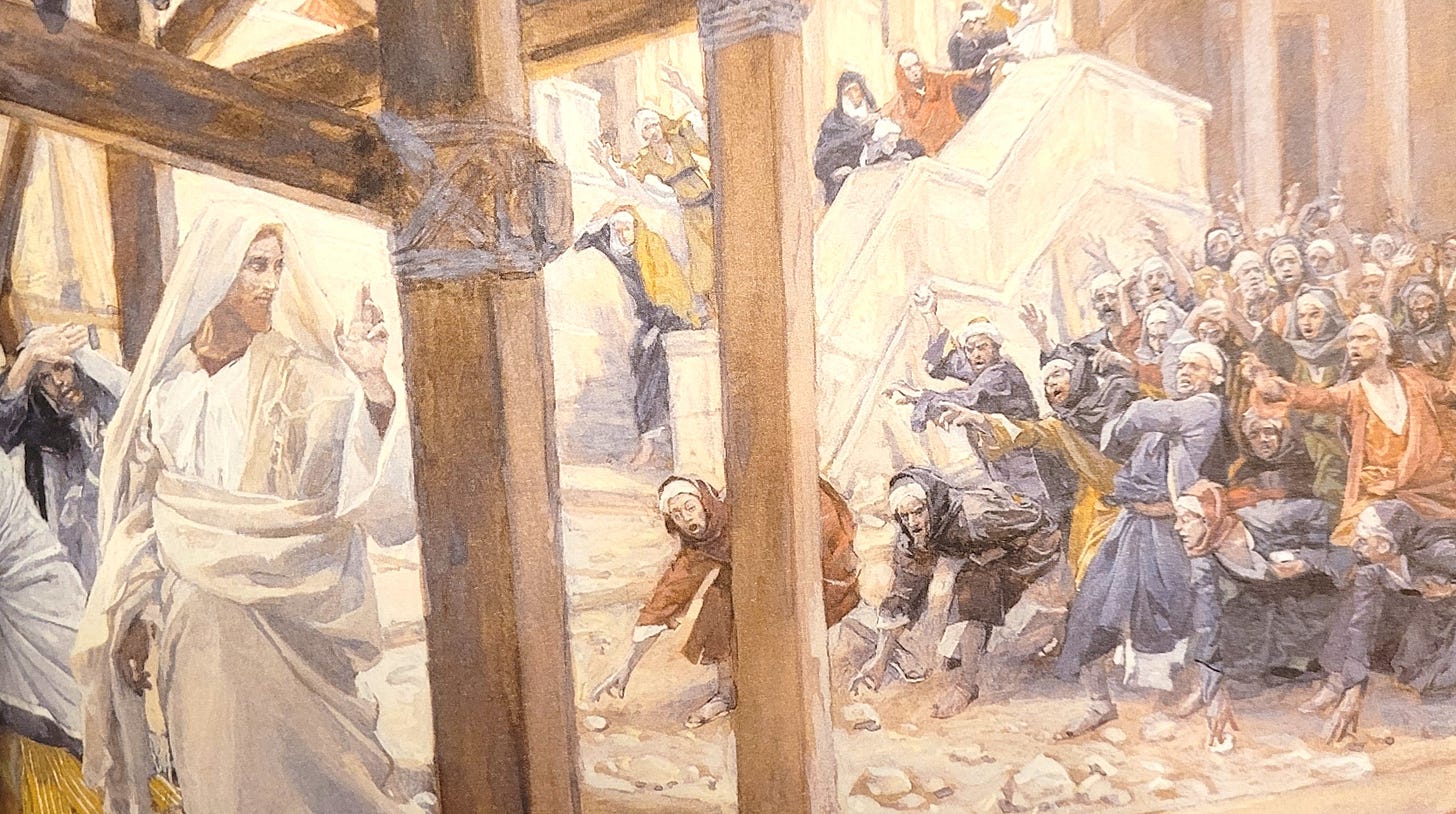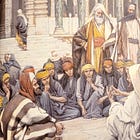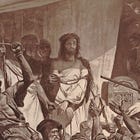What did Christ mean by, ‘Before Abraham was made, I AM’?
Some way that Our Lord never claimed to be divine in the Gospels. This passage shows that this is false.

Some way that Our Lord never claimed to be divine in the Gospels. This passage shows that this is false.
Editor’s Notes
NB: This is Part VII, the climax of a series on Christ’s disputes in the Temple. While the previous parts are rich reflections on these disputes, Parts V-VII are dealing directly with the Gospel for Passion Sunday, and can be read without reference to Parts I-IV.
In the previous part, Fr Coleridge explained why it is that the devil is a ‘murderer’ and ‘the father of lies.’
In this Part, Fr. Coleridge tells us…
How Christ makes the most solemn and explicit declaration of His eternal divinity.
That this truth lies at the heart of all His teaching, and demands faith and obedience.
Why He reveals it only after exposing the malice of His enemies and consoling His faithful.
He shows us that all of His words—about truth, freedom, and sonship—point to this final claim: Before Abraham was made, I AM.
This solemn affirmation of his divinity drives His enemies to fury—
and they take up stones to kill Him.
For more context on this episode, its significance and its place in the Roman Liturgy, see here:
Disputes in the Temple
The Preaching of the Cross, Part I, Chapter XIII
St. John viii. 12-20.
Story of the Gospels, § 93
Burns and Oates, London, 1886
Headings and some line breaks added.
Sung on Passion Sunday
How did the Sanhedrin know Christ would affirm his divinity under oath?
What prevented the Jews from hearing Christ’s words properly?
‘Abraham is dead’
And then He once more appeals to them with a great promise, which perhaps also contained a great threat. The words may be considered as addressed again to the believing Jews, to whom He had begun this discourse, though they were caught up by the hostile bystanders.
‘Amen, amen, I say to you, if any man keep My word, he shall not see death for ever.’
The words refer back to what He had already said about their continuing in His word, and being made free by the truth, and may therefore well be supposed to be addressed to the same persons. The promise here made, of not seeing death for ever, is a continuation and a crown of that former promise. They were to continue in His words and then to be His disciples indeed. They were to know the truth, and the truth was to make them free, and the freedom which they would thus gain would be connected, as He afterwards implied, with something like the adoption of sons, because it would be communicated to them by the Son. And now, as a crown to all, perseverance in obedience to His word is promised immunity from death for ever, that is, those who keep His word will rise hereafter, not to death and condemnation, but to eternal and glorious life.
But now again the cavils of the captious and unbelieving Pharisees are let loose upon Him. They catch up these words also, as if He had declared that those who kept His word were never to die.
‘The Jews therefore said, Now we know that Thou hast a devil. Abraham is dead, and the prophets, and Thou sayest, If any man keep My word, he shall not taste death for ever. Art Thou greater than our father Abraham, who is dead? and the prophets are dead. Whom dost Thou make Thyself?’
Thus they drew from our Lord a still plainer declaration than before.
‘Jesus answered, If I glorify Myself, My glory is nothing. It is My Father Who glorifieth Me, of Whom you say that He is your God, and you have not known Him, but I know Him, and, if I shall say I know Him not, I shall be like to you, a liar. But I do know Him, and do keep His word.’
Our Lord glorified by the Father
He takes first of all the charge now made against Him of exalting Himself.
‘Whom dost Thou make Thyself?’
He replies that as man He can have little power to glorify and exalt Himself, for man can do but little to gain glory. But the Divine works and words which the Father gave Him to do and to speak, these could not but glorify Him. But it is the Father, as He has said before, Who thus glorifies Him, not He Himself. This glorification of our Lord by His Father ought to have been familiar to them. ‘You say that He is your God, and you have not known Him,’ for the whole operation of the Father for the manifestation and exaltation of His Son has been lost upon you.
It is a clear proof that He must be unintelligible and undiscernible to you in His action on the world, by which He means men to know Him, that so magnificent an instance of His Providential dealings for the benefit of mankind should have been so utterly unacknowledged by you who call Him your God. Moreover, to know God implies the keeping of His Law, it implies the love of God as well as the barren knowledge, as St. John says that he that saith he knoweth God, and does not keep His commandments, is a liar.1
This seems to be in our Lord’s mind, for He goes on, ‘I have known Him, and if I shall say I know Him not, I shall be like you, but I do know Him, and do keep His word,’ the whole life of our Lord being one of obedience to the Father, and on that account an infinite glorification of the Father.
Abraham rejoicing
Then our Lord turns to the other point of their objection, that He had said that if any man kept His words he should not see death for ever, whereas Abraham and the prophets were dead. They were servants most dear to God, and yet they had tasted death. The Jews meant to imply that our Lord was making Himself greater than Abraham and the prophets, by saying that a man would never die who kept His word. Our Lord tells them clearly in reply that Abraham was one of those who had kept His word, and had not died for ever. The proof of this was that Abraham had seen His day, and was glad.
‘Abraham, your father, rejoiced that he might see My day, he saw it, and was glad.’
That is, as it seems, it was a matter of immense rejoicing to Abraham that he received the promise of the Incarnation of the Son of God, and looked forward, at the time when that promise was made, with great desire and longing, to the moment when it would be fulfilled. That moment came, in the course of ages, and Abraham, in the resting-place of the departed saints, had known of it, and he had rejoiced again at the knowledge. He rejoiced, therefore, that he was to see it, and he rejoiced that he did see it.
The day of our Lord seems thus to signify His Incarnation, which shed a flush of joy over the whole creation, and was no more hidden from the saints in Limbus than from the blessed angels in Heaven. Our Lord is continually implying that in Himself the prophecies are fulfilled, as in this same disputation He has already alluded to the promise of the prophet like unto Moses. Here He claims that in Himself are fulfilled the prophecies and promises made to Abraham and the Patriarchs.
The Jews were stung to fury by these words, which involved, not obscurely, the claim that He was indeed a greater than Abraham.
‘The Jews, therefore, said to Him, Thou art not yet fifty years old, and hast Thou seen Abraham?’
The number fifty seems to have been commonly used as noting the attainment of middle age, and the words do not of necessity imply any opinion as to the actual age of our Lord at this time, though they seem to have been made the foundation in very early times of a tradition that He was about forty when He died. There is also some difference in the Greek reading, the word being forty instead of fifty in some copies. The enemies of our Lord pervert His words, making Him say that He has seen Abraham, whereas He had only said that Abraham had seen ‘His day.’
‘Before Abraham was made, I AM’
There can be no doubt at all about the meaning of our Lord’s answer.
‘And Jesus said to them, Amen, amen, I say unto you, before Abraham was made, I am.’
He speaks of His Divine and Eternal Existence, which has no beginning, no measure, no end, one infinite Being and Life, and the source of all such being and life as are imparted to creatures, who come into existence at a certain time only, and live afterwards a partial and dependent existence, which by the side of the Eternal Being of God is as nothing. Before Abraham became, began, entered on such existence as he has, I am. Nor can there be any doubt as to the manner in which the words were understood by those to whom they were spoken. For St. John goes on, ‘They therefore took up stones to cast at Him,’ as if they had heard blasphemy and were bound at once to inflict on it the appointed punishment.
Attempt to stone our Lord
But, again, the time for His death had not come.
‘Jesus hid Himself, and went out of the Temple.’
He might have struck them with blindness, or paralysed their arms, or in some other way chastised them for their sacrilegious thought. But it was enough for Him to withdraw from their sight, which He did, either by making Himself invisible, or concealing Himself in some way in the crowd which was listening to the disputation.
While they were seeking Him, He quietly passed out of the Temple, and then immediately followed up the words, in which He had declared Himself to be God, by a most stupendous miracle, wrought without any solicitation, on one of the poor sufferers who were brought daily to beg for alms at the gate of the sanctuary. His enemies may hardly have ceased from their search after Him, hardly have laid down the stones which they had taken up to cast at Him, before the rumour reached them that He had proved His Divine power by the perfect cure of a man who was well known to have been blind from his birth.
This was the Divine answer to their thoughts, charging Him with blasphemy.
Fin.
Disputes in the Temple
How did the Sanhedrin know Christ would affirm his divinity under oath?
What prevented the Jews from hearing Christ’s words properly?
Read Next:
Here’s why you should subscribe to The Father Coleridge Reader and share with others:
Fr Coleridge provides solid explanations of the entirety of the Gospel
His work is full of doctrine and piety, and is highly credible
He gives a clear trajectory of the life of Christ, its drama and all its stages—increasing our appreciation and admiration for the God-Man.
If more Catholics knew about works like Coleridge’s, then other works based on sentimentality and dubious private revelations would be much less attractive.
But sourcing and curating the texts, cleaning up scans, and editing them for online reading is a labour of love, and takes a lot of time.
Will you lend us a hand and hit subscribe?
Follow our projects on Twitter, YouTube and Telegram:
1 St. John ii. 4.





